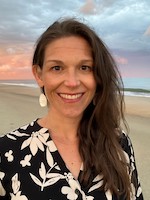Affiliate Faculty, Florida Climate Institute(opens in new tab)
Affiliate Faculty, UF Water Institute(opens in new tab)
Google Scholar(opens in new tab)
Focus Areas
- Focus Area 1: Earth System Science(opens in new tab)
- Focus Area 5: Catastrophes, Conservation, and Conflict(opens in new tab)
- Focus Area 6: Sustainability & Global Environmental Change(opens in new tab)
Research Statement:
I am a coastal scientist who researches extreme sea levels and coastal hazards to better understand how our coastlines are changing and the resultant consequences for people and places. I combine observational datasets with statistical and numerical models to understand the frequency, drivers, and impacts of coastal flooding and erosion events. Some of my interests include compound flooding hazards, extreme value analysis, coastal processes, human-natural coupled systems, flood risk management in a changing climate, and climate adaptation and resilience. The dynamic and broad nature of coastal science demands a highly interdisciplinary approach and I work with collaborators in different fields, institutions, and government agencies to enhance the resilience of communities to the impacts of coastal hazards.
Current Graduate Students
Doctorate
- Holli Capps Herron(opens in new tab)
- Caroline Huguenin(opens in new tab)
- Gabrielle Quadrado(opens in new tab)
- Md. Shamsudduha Sami(opens in new tab)
- Sabiha Sabrina
Master’s
- Ally Recalde
Recent Courses:
GEO 2230 Living with Rising Seas (Quest 2)
GEO 4285/6938: Water Risk and Extreme Events
GEO 3222 Sea Level Science
Recent Funded Projects:
2024-2027, The impact of local-scale variability on regional patterns of total water levels. National Oceanic and Atmospheric Administration(opens in new tab). PI: Serafin, Co-PI: Greg Dusek (NOAA), Meg Palmsten (USGS).
2024-2026, How colliding forces change: The influence of climate and geography on flood transition zones. U.S. Army Corps of Engineers/U.S. Coastal Research Program(opens in new tab). PI: Serafin, Co-PI Thomas Wahl (UCF).
2020-2022, When forces collide: Developing a scalable framework for compound flood risk assessment. U.S. Coastal Research Program(opens in new tab). PI Thomas Wahl (UCF), Co-PI Serafin.
Recent Publications
Serafin, K. A., Koseff, J. R., Ouyang, D., & Suckale, J. (2024). Moving from total risk to community-based risk trajectories increases transparency and equity in flood risk mitigation planning along urban rivers. Environmental Research Letters(opens in new tab), 19(6).
Quadrado, G. P., & Serafin, K. A. (2024). The timing, magnitude, and relative composition of extreme total water levels vary seasonally along the US Atlantic coast. Journal of Geophysical Research: Oceans(opens in new tab), 129(9).
Bowers, C., Serafin, K. A., & Baker, J. W. (2024). Uncovering Drivers of Atmospheric River Flood Damage Using Interpretable Machine Learning. Natural Hazards Review(opens in new tab), 25(3), 04024022.
Bowers, C., Serafin, K. A., & Baker, J. W. (2024). Temporal compounding increases economic impacts of atmospheric rivers in California. Science Advances(opens in new tab), 10(3).
Hsu, C. E., Serafin, K. A., Yu, X., Hegermiller, C. A., Warner, J. C., & Olabarrieta, M. (2023). Total water levels along the South Atlantic Bight during three along-shelf propagating tropical cyclones: relative contributions of storm surge and wave runup. Natural Hazards and Earth System Sciences(opens in new tab), 23(12), 3895-3912.
Bowers, C., Serafin, K. A., Tseng, K. C., & Baker, J. W. (2023). Atmospheric river sequences as indicators of hydrologic hazard in historical reanalysis and GFDL SPEAR future climate projections. Earth’s Future(opens in new tab), 11(12).
Huguenin, C. N., Serafin, K. A., & Waylen, P. R. (2023). A spatio-temporal analysis of the role of climatic drivers influencing extreme precipitation events in a Costa Rican basin. Weather and Climate Extremes(opens in new tab), 42, 100602.
Jane, R. A., Malagón‐Santos, V., Rashid, M. M., Doebele, L., Wahl, T., Timmers, S. R., Serafin, K.A., Schmied, L., & Lindemer, C. (2022). A hybrid framework for rapidly locating transition zones: A comparison of event‐and response‐based return water levels in the Suwannee River FL. Water Resources Research(opens in new tab), 58(11).
Juarez, B., Stockton, S. A., Serafin, K. A., & Valle‐Levinson, A. (2022). Compound flooding in a subtropical estuary caused by Hurricane Irma 2017. Geophysical Research Letters(opens in new tab), 49(18).
Shope, J. B., Erikson, L. H., Barnard, P. L., Storlazzi, C. D., Serafin, K., Doran, K., … & Ruggiero, P. (2022). Characterizing storm-induced coastal change hazards along the United States West Coast. Scientific Data(opens in new tab), 9(1), 224.
Bick, I. A., Santiago Tate, A. F., Serafin, K. A., Miltenberger, A., Anyansi, I., Evans, M., Ortolano, L., Ouyang, D., & Suckale, J. (2021). Rising seas, rising inequity? Communities at risk in the San Francisco Bay Area and implications for adaptation policy. Earth’s Future(opens in new tab), 9(7).
Kasmalkar, I. G., Serafin, K. A., Miao, Y., Bick, I. A., Ortolano, L., Ouyang, D., & Suckale, J. (2020). When floods hit the road: Resilience to flood-related traffic disruption in the San Francisco Bay Area and beyond. Science Advances(opens in new tab), 6(32).
Educational Background
- Postdoctoral Research Fellow, Department of Geophysics, Stanford University, 2018 – 2019
- PhD in Ocean, Earth, and Atmospheric Sciences, Oregon State University, 2017
- M.S. in Ocean, Earth, and Atmospheric Sciences, Oregon State University, 2013
- B.A. in Environmental Studies, Connecticut College, 2008
